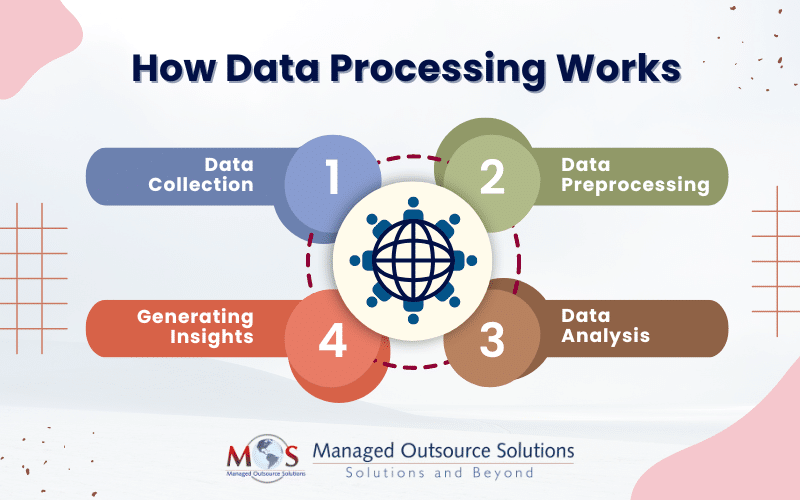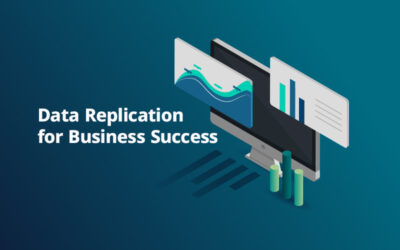In addition to structured data, companies across various industries collect huge volumes of unstructured data generated through the Internet of Things, text documents, emails, social media, photos, and videos, and other digital activities. To get the most out of this information, they need to transform it into actionable insights. Data processing is the first step in this direction. Data processing services play a crucial role in optimizing business operations by converting raw data into meaningful information.
Approximately 402.74 million terabytes of data are created each day, according to Exploding Topics. Fuelled by the explosion of digital activities, this number is expected to reach 181 zettabytes of data by 2025. Data processing transforms raw data into readable formats like charts, graphs and documents, relevant users can understand and use. For example, by processing demographic data, a digital marketing company can develop location-specific campaigns. Information processing and real-time analytics also find application in tracking transactions, detecting fraud, remote patient monitoring, customer behavior analysis, inventory management, fleet and cargo tracking, predictive maintenance, and more.
How Data Processing Works
Processing data is a multi-step procedure that involves collecting, filtering, sorting, analyzing, and processing raw data and providing to the appropriate users in a readable format.
Data collection: Every business has raw data from various sources such as sales records, customer interactions, financial transactions, and operational logs. The first step is collecting this raw data and entering it into digital formats usable for decision-making.
Data preprocessing: This stage involves cleansing and organizing the data by removing inconsistencies, addressing missing values, and converting it into a standardized format.
Data analysis: Next, various analytical techniques, such as data mining and machine learning, are applied to extract insights and patterns from the data.
Generating insights: Finally, the analyzed data is used to generate meaningful information such as reports, dashboards, or visualizations. Businesses can use this information to get valuable insights into performance, trends, and areas for improvement.
How Business Operations Benefit from Data Processing
Data processing helps businesses optimize their operations in several ways:
Improves Decision-Making
With access to accurate and timely information, companies can make more informed decisions about strategies, resource allocation, and problem-solving. For example, analyzing historical sales to predict future demand helps retailers balance their stocks and optimize inventory management. It reduces inventory carrying costs and improves customer satisfaction.
Enhances Operational Efficiency
Businesses can optimize their processes reduce waste and improve overall efficiency by identifying patterns and bottlenecks in the data. In transportation, for instance, processing GPS and traffic data enables route optimization. By improving efficiency, this leads to reduced fuel consumption and faster delivery times.
Mitigates Risks
By processing and analyzing large volumes of structured and unstructured data, financial institutions can detect patterns, anomalies, and early warning signals before they escalate or manifest. By predicting trends, data processing and analytics can help identify and mitigate risks, such as potential fraud, compliance issues, or market changes.
Supports Informed Planning
By helping businesses anticipate and adapt to future challenges and opportunities, insights from data processing can support long-term strategic planning, budgeting, and forecasting. For instance, in the energy sector, consumption analysis supports grid management and energy distribution planning. This can promote efficient energy use.
Boosts Competitive Advantage
Leveraging data-driven insights can give businesses a competitive edge by allowing them to make more informed decisions, respond quickly to market changes, and offer targeted products or services. Collecting and processing customer data using advanced techniques allows businesses to offer a better product that attracts more customers. For example, by analyzing customer feedback and reviews, a clothing company can generate valuable on the most popular product categories and styles among different customer segments. They can use this information to develop new products or enhance existing ones to better meet the needs of their target customers, building competitive advantage.
The Future of Data Processing
As it all other data-related applications, ML and AI are changing the game in data processing. Traditional manual methods of handling information, especially large volumes, are time-consuming and pose risk of human error.
ML and AI automate data processing and analytics, improving capabilities, accuracy, reliability, and efficiency, and enabling business to achieve a level of efficiency previously unattainable.
However, ML and AI models require accurate, structured, relevant data to process the insights for smoother business workflow. That’s where partnering with an experienced business process outsourcing company can be a transformative move. Experts will clean and organize your data, allowing you to leverage advanced data analytics technology to optimize your operations.
Partner with our experienced BPO team and optimize your business operations!





